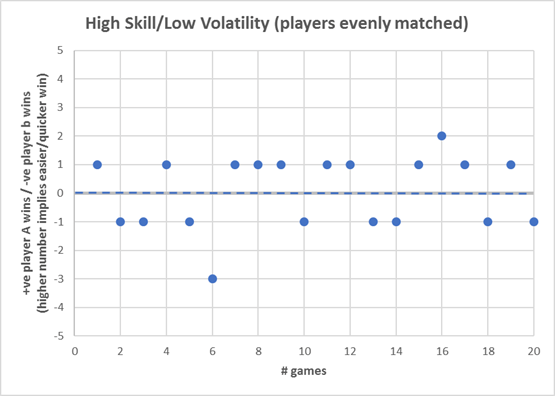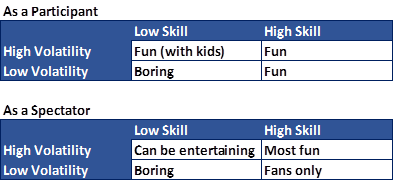A simple answer that many people will come up with is that we play games to win. But I think this is much less true than people think and many other aspects of games are more important. Participating in a game and also being a spectator can often be hugely enjoyable irrespective of who wins. There is clearly a lot more to games than winning.
For a start, it’s important to consider what we mean by “winning”. Does it mean the same to all participants?
Some examples
Playing golf with friends, is the objective to have the fewest number of strokes over 18 holes? I know plenty of people whose play is not consistent with that. Other goals are often far more important. The desire to hit the longest drive of the day, the most outrageous recovery, get a birdie or simply to have the best story to tell in the bar later.
Do people really play poker to win money? I think we do it because it is fun and it is often the outrageous play that generates the best story. The worst poker players often have the best stories.
In these two examples, it is clear the enjoyment of the game is not purely coming from “winning”. The thrill of participating comes from the volatility of the outcome and is highly enjoyable, and this is a similar motivation for being a spectator as well.
In the previous post, I introduced the idea that we can categorise games according to both skill and volatility. These different categories have important consequences for why people play these games.
Spectating versus Participating
If we think about the quadrants for participants versus spectators, the experiences are similar but not the same.
Low Skill Games
Whereas low skill games can be fun to play if there is high volatility in the outcome (e.g. snakes and ladders or roulette), it is debatable how entertaining they will be to watch. Enjoyment would most likely come from the seeing the joy of your children playing or the drama of the emotions of the participants.
High Skill Games
What is perhaps less obvious is that adding volatility even to highly skilled games generally makes them more enjoyable both as a participant and spectator.
Social games – add volatility
If you want to play a game of skill socially with friends, it is helpful if there is a decent amount of volatility in the game. This will mean that even with a decent mismatch in ability, none of the players can be sure of the outcome and on any given day anyone might win. Therefore, pool is a much more fun game to play with a mixed group of friends than snooker.
Importantly these sorts of games will be highly enjoyable for spectators, the level of volatility creates an enjoyable amount of uncertainty in the results.
Serious Games – low volatility
Games with low volatility and high skill can be extremely engaging. A game of chess in a tournament between 2 players of similar standard with a long-time limit is an absorbing pursuit. Equal matched opponents make it difficult to call. These types of games can be fantastic as a participant, as you know how you play on the day is all that matters. Luck has a very minor part to play.

As a spectator, this game may not be much fun at all!
People who watch chess are keen players themselves in my experience. Even then, entertaining commentary by experts is usually required to interpret and explain what is going on.It is hard to persuade a casual player that watching the World Championships is fun, in fact they generally find it astonishing that I would do it.
Spectator sports & games – add lots of volatility!
Large, popular spectator sports are invariably high skill. But they also all have high volatility, and in many cases deliberately adjust the rules to make sure there is plenty of it.
Tennis
Have you ever wondered why tennis has games and sets? It is to add volatility to the result. The better player will still win on average but the chances of an upset are increased.
An obvious alternative method of scoring would be that you play a specified number of points, with equal time serving, and the person with the higher number of points wins. But this sounds boring. The better player will tend to win and there is little drama during the game.
The rules of tennis cleverly make some points worth a lot more than others, to make things less predictable. If you win all your service games to love, but lose just one close one in a set you may lose the set even if you won more points during the set. If you win a set 7-6 and then lose one 0-6, you are level despite winnings far fewer points.
Rugby
I just watched the Lions tie the series with the All Blacks. If the scoring system had been to play 3 80 minute sessions and the total number of points won then the All Blacks would have been comfortable, and highly predictable, winners.
Football (soccer)
Goals are hard to achieve and just one often decides a game. Even relatively poor teams can score against much better ones and good teams can struggle to score against far weaker ones. This means that the league will generally be won by a very good team but any individual match has a high level of uncertainty and thus is exciting to play and watch.
Golf
I spent a very enjoyable time watching the golf at the Open at Royal Birkdale last weekend Spieth on the final day played an amazingly exciting round and ended up going on to win.
At hole 13:
He didn’t just miss the fairway
He hit the ball over 100 yards right of the fairway
So far away he eventually declared the shot unplayable and took a penalty, walked another 50 yards away from the hole and eventually hit the ball between some TV trailers on the practice ground.
He managed to finish that hole only 1 over, a bogey, a remarkable achievement
The next four shots were even more remarkable:
14th Hole 1 under, birdie
15th Hole 2 under, eagle
16th Hole 1 under, birdie
17th Hole 1 under, birdie
And by hitting par at the 18th, he took the championship.
Rory McIlroy was 5 over after 6 holes on the first day but went on a charge on the last day and despite losing a ball on the 15th, made eagle on 17 while Speith was in serious trouble on 13 and his odds of winning were tumbling fast from 100-1 to 20-1.
I like golf. But the volatility is what made the event so much fun to watch.
Formula One
Watching Vettel take pole and then leading a procession to the chequered flag for over 2 hours, for a couple of seasons was pretty dull. This does not mean that the skill of the engineers, designers and driver was any less admirable. It is just dull to watch the best car win every time with complete certainty. Formula 1 keeps trying new rules and specifications all the time to make the winner less predictable which the drivers and the fans both prefer.
Chess
Even chess can be tweaked to add volatility to the result which spectators and participants both think makes it fun – reduce the time limit and play Blitz.
Conclusion
It’s clear from the explorations in these posts that the enjoyment of playing games and sports does not derive purely from the act of winning. When skill and volatility are combined in a game, it can be thrilling for participants and spectators alike. It may be not totally obvious that volatility is such important ingredient, but it should be now clear that it’s often added to games and sports to make them better for spectators.




“Do people really play poker to win money?”
This question is very similar to a section of the book The Money Game, in which the author contemplates
whether people trade/invest in markets to make money or, if not, what their alternative reasons are.
LikeLike
Your video link is wonderful. https://www.youtube.com/watch?v=TAaSJcIIruI
It gives 4 attributes to a game
1. Conflict
2. Chance
3. Make believe
4. Vertigo
in Games 1 I talk about Conflict and Chance – which i call skill and volatility. for a broader definition of what a game is then adding make believe is essential – in my definition i am not focused on that aspect of “playing”.
In this post I describe how adding volatility is fun – but the video explains it well that what is fun about it is vertigo. The aim is to generate the excitement or stress which simulates real life threats and trains you for them.
This idea seems particularly important for gambling which i will talk about more in upcoming posts.
The video is focused on the anthropological aspects of games. why humans play them. my posts are focused on how people make important mistakes by misunderstanding what type of game they are playing or observing. If you play one type of game e.g. you love the feeling of vertigo, or you seek to dominate others, or you like equal battles of high skill – then you may fail to understand other games by making false assumptions about the game and its players.
LikeLike